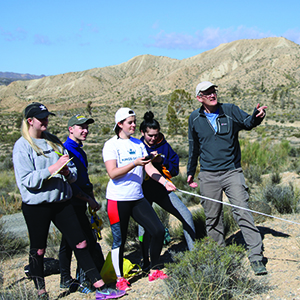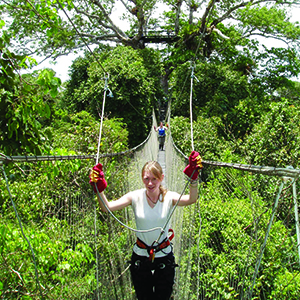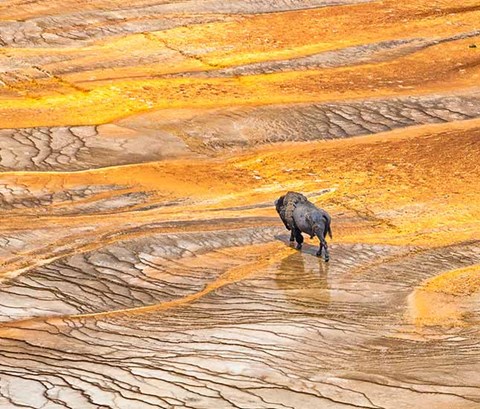Start date:
Course information
UCAS code F8F6
Institute code L34
Taught by School of Geography, Geology and the Environment

2nd in the UK for Geography (UniCompare, 2026)
Course description
Course description
This course guides you through the functioning of planet Earth, from the distant past to the present. In this degree, carefully selected complementary modules from Physical Geography and Geology are structured to provide students with with an understanding of Earth System functioning across a range of space-time scales. This includes knowledge of modern landscape processes, how insights from the modern world allow us to interpret the rock record and how fossil record allows us to understand the patterns of life on Earth today. You will also investigate contemporary environmental processes, including topics like climate change, desertification and water quality. Studying both the past and present enables students to reflect upon, and tackle many of the environmental challenges facing the planet.Entry requirements
Entry requirements
- A-levels: ABB – BBB including at least one from: Geology, Maths, Biology, Chemistry, Physics, Use of Maths, Computer Science, Environmental Science or Geography.
- EPQ with A-levels: BBB + EPQ at grade B. A-level subjects including at least one from: Geology, Maths, Biology, Chemistry, Physics, Use of Maths, Computer Science, Environmental Science or Geography.
- GCSE: Grade C/4 in English Language and Maths.
- Access to HE Diploma: Pass science diploma with a minimum of 45 credits at level 3, 30 of which must be at Distinction. To include Physics, Chemistry and Maths Level 3 credits.
- International Baccalaureate: Pass Diploma with 30 points, including grade 5 in one science subject at HL. Must include a minimum of grade 4 in SL Maths or 3 at HL if 4/C not held at GCSE. Must include a minimum of grade 4 in English A or 5 in English B if minimum of grade 4/C not held in English Language at GCSE.
- BTEC Nationals: Pass Diploma with DDD (Science Related). Please contact School regarding eligibility.
- T Levels: Distinction in either: Design, Surveying and Planning for Construction or Science (with an Occupational Specialism in Laboratory technician).
Other official national and international qualifications considered from across the world. You can review some of the qualifications we accept on our countries page and English Language equivalencies.
If your qualification or country is not listed, please contact us for more information, including the name and result of the qualification you have studied.
Flexible entry requirements
We welcome applications from motivated students whose predicted grades are slightly below our standard entry requirements. We understand that predicted grades are not always an accurate reflection of your final results, and we’re happy to consider your application. Although we can’t guarantee an offer due to the high volume of applications, if you’re eligible, we may still offer you a place based on our standard requirements.
Contextual offers
The University of Leicester is committed to providing equitable opportunities for all applicants from all backgrounds. We make contextual offers to support students who may be impacted by the area they live in, their personal circumstances or who have completed one of our progression programmes. These offers are usually one or two grades lower than the standard entry requirements. To qualify for a contextual offer, you must apply for an eligible course and meet specific criteria – check if you’re eligible.
Selection Process
When considering your application, we will look for evidence that you will be able to fulfil the objectives of the course and achieve the standards required. We will take into account a range of factors including previous exam results.
Applicants are not normally interviewed. If you receive an offer you will be invited to visit the School of Geography, Geology and the Environment.
English Language Requirements
IELTS 6.0 or equivalent. If your first language is not English, you may need to provide evidence of your English language ability. If you do not yet meet our requirements, our English Language Teaching Unit (ELTU) offers a range of courses to help you to improve your English to the necessary standard.
International Qualifications
Find your country in this list to check equivalent qualifications, scholarships and additional requirements.
Countries ListFees and funding
Fees and funding
UK Students
Starting in 2026
- £9,790 in your first year, subject to Parliamentary approval.
- For the 2027/28 academic year, the Home UK tuition fee is expected to be £10,050, subject to Parliamentary approval. Further increases are anticipated to be implemented automatically through government legislation, therefore it is likely that your tuition fees will rise for each subsequent year of your studies.
Find out more about tuition fees, including year abroad, placement years, scholarships and funding.
International Students
Starting in 2026
- £25,100 per year
If you are resident outside the UK and the Republic of Ireland, you will need to pay a deposit to secure your place. This will be subtracted from your total tuition fee.
Find out more about tuition fees, including year abroad, placement years, scholarships and funding.
Careers and employability
Careers and employability
Geographers and Geologists are highly competitive in the job market as their degrees furnish them with a range of highly sought-after skills. As well as studying topics that consider all of the major global challenges of the 21st century, our graduates are equipped with a range of subject specific and transferable skills (e.g. teamwork, communication, resilience, planning, problem solving).
Key statistics
- 97% of graduates in work or further study after 15 months
- Average salary 10 years after graduation is £40,100
- More than 50 companies are actively involved with Geology at Leicester, from funding major research projects to work experience opportunities.
- Recent employers include: Environment Agency, Yorkshire Water, Aon, National Library of Scotland, KPMG, NHS, Cabinet Office, Department of Work and Pensions, HSBC, Network Rail, The British Museum, BP, Rio Tinto, British Gypsum, RSK, Jacobs, Hydrock, Zeiss, The Civil Service, Capita, The Government of South Australia, Isle of Man Government.
Supported by the University’s Careers and Employability Service, employability is embedded in all of our curricula from year one:
- The Leicester Award for Employability personal development programme is embedded in core year one and year two modules, providing students with opportunities to reflect on their motivations, personality traits, transferable skills, and future career goals
- All students have lifetime access to and support from our award-winning Careers and Employability Service.
- We have a dedicated School Careers Tutor who works with the Careers and Employability Service to support careers fairs, disseminate job opportunities and career development courses, and to provide practical information.
- We run a School-wide annual careers day; recent speakers have included the Civil Service, Selfridges & Co, Hatch Regeneris, the Leicestershire and Rutland Wildlife Trust, the Environment Agency, Ordnance Survey and the Centre for Ecology and Hydrology.
- All of our degrees allow include a four year “with a Year in Industry” option, where the third year of the degree is spent on a work placement.
The School has established links with many businesses and Government departments, including Natural England, the European Space Agency, the Home Office and the Joint Research Centre of the European Commission.
Case studies

Megan Hudson (BSc Geography) is now a General Manager at Fenland SOIL; a farmer-led, multistakeholder research organisation that aims to mitigate greenhouse gas emissions from lowland agriculture. Her work involves a wide range of activities, spanning finance and marketing, meeting and day to day work with growers and stakeholders, through to working on research projects with universities and organisations like Natural England.
 Momin Ashraf (BA Geography) is a member of the GIS intelligence team at the Satellite Applications Catapult in Didcot. His work is focused on international development and humanitarian aid. He uses satellite and spatial data to monitor issues such as water security, internally displaced people and conflict zones. His skills and interests in GIS allowed him to work in a range of industries during his year in industry, and it was his GIS, Remote Sensing and Information Visualisation courses that provided the key skills shaping his career (skills in critical industry-standards such as QGIS, ArcGIS, Tableau, SQL, Python).
Momin Ashraf (BA Geography) is a member of the GIS intelligence team at the Satellite Applications Catapult in Didcot. His work is focused on international development and humanitarian aid. He uses satellite and spatial data to monitor issues such as water security, internally displaced people and conflict zones. His skills and interests in GIS allowed him to work in a range of industries during his year in industry, and it was his GIS, Remote Sensing and Information Visualisation courses that provided the key skills shaping his career (skills in critical industry-standards such as QGIS, ArcGIS, Tableau, SQL, Python).
 Tara Ahmad (BA Human Geography) joined the Lidl UK Graduate Programme. Tara had a particular interest in economic geography and during her BA Human Geography degree she particularly enjoyed the Economy Society and Space module, which focuses on the commoditisation of foodstuffs. During her second and final years she was a course representative and a co-chair of the student-staff committee. This meant lots of scope to present, collaborate and share her work, providing the confidence to move forward into her future career.
Tara Ahmad (BA Human Geography) joined the Lidl UK Graduate Programme. Tara had a particular interest in economic geography and during her BA Human Geography degree she particularly enjoyed the Economy Society and Space module, which focuses on the commoditisation of foodstuffs. During her second and final years she was a course representative and a co-chair of the student-staff committee. This meant lots of scope to present, collaborate and share her work, providing the confidence to move forward into her future career.
Careers and Employability Service
Get career-ready at Leicester with guidance from our award-winning Careers and Employability Service. We're here to give you a lifetime offer of support, even after graduation. Our team of specialist careers advisers and mentors will help you every step of the way. From supporting you with CVs and interviews, to volunteering opportunities and placements, we’re here to help you reach your professional goals.
Related courses
Related courses
Sustainable Development Goals
Sustainable Development Goals
We are committed to providing skills and knowledge to help prepare you tackle global challenges. We have mapped our undergraduate degrees for learning which aligns to the 17 UN Sustainable Development Goals.
This degree includes learning which relates to the following UN Sustainable Development Goals:
- Goal 4: Quality education
- Goal 6: Clean water and sanitation
- Goal 11: Sustainable cities and communities
- Goal 13: Climate action
- Goal 14: Life below water
- Goal 15: Life on land
Testimonial
"It has been an amazing and enriching experience studying Geography at the University of Leicester. I have been able to broaden my knowledge and curiosity into specific areas of Geography, such as paleogeography, ecology and geomorphology. This has been due to excellent learning opportunities, alongside practical lab and fieldwork, including an overseas field trip to Almeria, Spain. There is a close-knit and pleasant atmosphere in the School, enhanced by the willingness of the staff to offer their support and their contagious passion for their subject areas, reflected in their eagerness to share their past and current research with students throughout the course."
Charlotte – Geography BSc student, 2024

Course structure
Year 1
Year 1
Your first year provides foundational knowledge for the Earth Sciences and Physical Geography, considering the origin, structure and composition of Earth, the operation of plate tectonics and the processes controlling our weather and climate. We also introduce you to a wide range of teaching approaches (practicals, computer labs, tutorials, workshops, lectures) and develop key practical skills (e.g. Geological Maps and Structures). The residential fieldtrip to Arran brings your learning into practice in the field.
Modules
- Palaeobiology and the Stratigraphic Record
- Skills for Professional Geographers
- The Digital World
- The Contemporary Earth System
- Geological Maps and Structures
- Introductory Field Course
- From Core to Crust
- Our Dynamic Planet
The modules listed reflect those currently available to students. Every year, we review our modules and their content to ensure that our courses maintain the best academic and student experience possible. Whilst this does mean elements of your course may change in future academic years, it ensures your course is giving you a research-inspired education and preparing you for your future.
Year 2
Year 2
The second year develops key research and analytical skills, while further developing subject-specific knowledge. You will study the operation of contemporary Earth surface processes as well the sedimentary rock record and the fossil record. This core content is designed to provide a sufficient breadth of material to allow specialisation as you move into your final year. The residential trip to Almeria, Spain, provides field experience of contemporary landscape processes and the region’s geological record, as well as building important skills in project design and teamwork.
Core modules
- Climate Change: Impacts, Vulnerability and Adaptation
- Catchment Systems
- Magmatic and Metamorphic Processes
- Major Events in the History of Life
- Research Design
- Overseas Field Course
- Introduction to Geochemistry
* Qualifying mark of 40% in dissertation proposal is required for progression into year 3.
Option modules
Choose one option module from:
- Depositional Processes and Environments
- Geographical Information Science
- An Introduction to Past Global Climate Changes
The modules listed reflect those currently available to students. Every year, we review our modules and their content to ensure that our courses maintain the best academic and student experience possible. Whilst this does mean elements of your course may change in future academic years, it ensures your course is giving you a research-inspired education and preparing you for your future.
Year Abroad or in Industry (optional)
Year Abroad or in Industry (optional)
If you want to, you can spend the third year of the BSc studying abroad at one of our partner institutions or working in an industrial placement. Alternatively, you can opt to continue studying at the University and complete your degree in three years.
Year Abroad
We’ll make sure you have everything you need for your future career: not just by awarding you a high quality degree, but also by helping you to develop the skills, knowledge and confidence you need to make your mark in the world as a Citizen of Change. One way you can do this is by opting to take a Year Abroad between Years 2 and 3 of your degree.
Studying abroad is not just for people who are interested in travelling and meeting new people. It is about acquiring life skills that are becoming increasingly significant for a wide range of jobs in our modern globalised society. Whether you go on to a career in the private, public or third sector - or plough your own furrow as an entrepreneur – you will find the experience invaluable.
For more information, including a list of destinations, please visit our Study Abroad website.
Please note
- A year spent abroad still incurs a tuition fee, but this is much lower than for a normal year at Leicester. See the Fees and Funding tab of this page for details.
- You may be eligible for a travel grant from Student Finance England.
- Places are offered on a competitive basis, and eligibility is dependent on your academic performance in Years 1 and 2.
- Language courses, at beginners or advanced level, are available through our Languages at Leicester scheme.
Year in Industry
A Year in Industry gives you the opportunity to stand out from the crowd when it comes to applying for graduate jobs with work experience incorporated into your programme of study. If this is for you, in Year 2 you will take a module in which we prepare you for that year in work and support you with your search for a placement in an industry or organisation relevant to your career aspirations. After your Year in Industry you will return to University for your final year of study.
A year in industry still incurs a tuition fee, but this is much lower than for a normal year at Leicester. See the Fees and Funding tab of this page for details.
The modules listed reflect those currently available to students. Every year, we review our modules and their content to ensure that our courses maintain the best academic and student experience possible. Whilst this does mean elements of your course may change in future academic years, it ensures your course is giving you a research-inspired education and preparing you for your future.
Final Year
Final Year
Your final year incorporates a blend of teaching and independent research. You will select a topic to research in your dissertation and choose from a wide range of optional modules.
Core modules
Option modules
Choose two option modules from:
- Environmental Geoscience
- Crustal Dynamics
- Understanding Ecosystems and Environments of the Distant Past
- Sustainability Enterprise Partnership Project
Choose four option modules from:
- Earth Science in Education
- Planetary Science
- The Forensic, Archaeological and Geological Application of Microfossils
- Physical Volcanology
- Remote Sensing of the Environment
- Research Communication
- Stable Isotopes in the Environment
- Drylands: Landscapes, Ecosystems and People
- Water Quality Processes and Management
The modules listed reflect those currently available to students. Every year, we review our modules and their content to ensure that our courses maintain the best academic and student experience possible. Whilst this does mean elements of your course may change in future academic years, it ensures your course is giving you a research-inspired education and preparing you for your future.
Fieldwork
Fieldwork
In year one, the Introductory Field Course takes place on Arran, a Scottish island with more geological variety per square kilometre than virtually anywhere else in the world. You’ll rapidly develop observation and recording skills through active participation in scientific discovery.


In your second-year residential field training will focus on the development of skills that prepare you for independent research and your final year dissertation project. Recent locations have included Almeria in Spain.
Our final year optional field courses present an opportunity to develop advanced field skills. They are a chance to experience some of the world’s most remarkable environments, including the Amazon Rainforest (Ecuador) and Tenerife.
All of our core (years one and two) field course costs are largely subsidised by the University of Leicester and we ask only for annual contributions of £100 in Year One and £250 in Year Two. Optional final year field courses do come with additional costs, although there are bursaries available.
And you’ll be pleased to know our staff are involved in field-based research worldwide, ensuring that our teaching draws on active field experience.
Fieldwork locations may vary and are subject to availability.
The modules listed reflect those currently available to students. Every year, we review our modules and their content to ensure that our courses maintain the best academic and student experience possible. Whilst this does mean elements of your course may change in future academic years, it ensures your course is giving you a research-inspired education and preparing you for your future.
Why Leicester?
Job prospects for graduates of the School of Geography, Geology and the Environment are excellent: 97% of our Geography students and 95% of our Geology students are employed (or studying for a Masters degree) six months after graduating. (DLHE)
Fieldwork is integral to all of our degrees. Our field trips will take you to some of the world's most remarkable environments, such as Copenhagen and Berlin.
Our outstanding teaching and student support is reflected in our NSS 2025 results. We were ranked in the top 10 in subjects aligned to Physical Geography for ‘Student Voice’ and ‘Academic Support’ in the NSS 2025 (according to Times Higher Education NSS 2024 methodology applied to the NSS 2025 data).
You will definitely want to join the Students' Union's Geography Society which offers a great mix of academic support and social events. Leicester GeogSoc is affiliated to EGEA, a massive European network providing great opportunities for exchanges and professional development.
Teaching and learning
Teaching
You will be taught through a mixture of lectures, tutorials, seminars, practicals and fieldwork. All lecture material is available online through our virtual learning environment Blackboard. Residential field trips are run by academic staff throughout the degree and provide extended periods of small group teaching in field contexts.
Assessment
You will be assessed through a combination of coursework, fieldwork, independent reports and projects, seminars, oral and poster presentations and computer-based tests, as well as formal exams.
Independent learning
When not attending lectures, seminars or other timetabled sessions you will be expected to continue learning independently through self-study. Typically, this will involve practical activities, worksheets, reading journal articles and books, working on individual and group projects, undertaking research in the library, preparing coursework assignments and presentations, and preparing for exams. This time also includes time meeting staff, such as your personal tutor, which you can arrange via regular staff office hours. To help with your independent learning, you can access the Library and our social study spaces in halls of residence.
Your contact hours will depend on the option modules you select. You can see details of the contact hours on individual module pages.
Academic support
Our Centre for Academic Achievement provides help in the following areas:
- study and exam skills
- academic writing
- presentations
- dissertations
- numerical data skills
- referencing sources
Our AccessAbility Centre offers support and practical help for students with dyslexia or other specific learning difficulties, including physical, mental health or mobility difficulties, deafness, or visual impairment.
Teaching staff
This is a research-led degree. You will be taught by an internationally recognised experts in their fields, whose expertise and knowledge are closely matched to the content of the modules on the course. Our third year specialism modules map closely to staff’s current research and to our cutting edge facilities where you will get hands on experience. PhD research students who have undertaken teacher training may also contribute to the teaching of seminars under the supervision of the module leader. Our teaching is informed by the research we do. You can learn more about our staff by visiting our staff profiles.
Apply now
| Course | Qualification | Duration | UCAS Code | Availability |
|---|---|---|---|---|
| Course Physical Geography and Geology | Qualification BSc | Duration 3 years | UCAS Code F8F6 | Availability How to apply |
| Course Physical Geography and Geology with Year Abroad | Qualification BSc | Duration 4 years | UCAS Code F8F6 | Availability How to apply |
| Course Physical Geography and Geology with Year in Industry | Qualification BSc | Duration 4 years | UCAS Code F8F6 | Availability How to apply |




